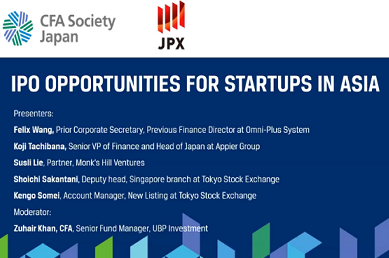ESG
JPX and QUICK Publish New ESG Guidance for Listed Companies

JPX and QUICK published a new Anthology of ESG Issues in March 2022. This article introduces its background, aims, and contents, including a detailed example of the structure. JPX and QUICK hope that this new guidance can further encourage constructive dialogue between Japanese listed companies and investors.
The June 2021 revision of Japan's Corporate Governance Code specifies sustainability issues, such as taking care of the environment and respect for human rights, as important management issues that company boards should proactively address in terms of increasing corporate value. It is expected that this revision will lead to improved sustainability-related activities and disclosure from listed companies from 2022, including on human rights and on metrics for evaluating climate-related risks and opportunities such as GHG emissions data.
Efforts to enhance non-financial information disclosure are also progressing globally, notably with the creation of the International Sustainability Standards Board (ISSB) by the IFRS Foundation in November 2021.
Given these developments, in March 2022, Japan Exchange Group (JPX) and QUICK published the JPX-QUICK Anthology of ESG Issues, which aims to help listed companies respond to and disclose on ESG issues through facilitating understanding on what kind of ESG issues are considered important and how they may affect Japanese companies. This is then expected to lead to more constructive dialogue between companies and investors. The Anthology is intended to be used in tandem with JPX and Tokyo Stock Exchange's Practical Handbook for ESG Disclosure and is available for download on the websites of both JPX and QUICK (Japanese only).
The Anthology is aimed mainly at listed companies who are just beginning to tackle ESG disclosure or employees just moving into the field, but also contains information that could be useful for companies already enacting disclosure or employees with some experience. It provides guidance on 31 E, S, and G issues over ten carefully chosen topics that make up the foundations of ESG information disclosure: climate change, preventing pollution, sustainable resource use, water, biodiversity, respecting human rights, hiring and working practices, corporate governance, ESG risk management, and preventing corruption. It focuses on what kind of impact each globally-recognized ESG issue could have on the value of Japanese companies in particular.
Of course, the above ten topics do not cover all existing ESG issues: they were prioritized for ease of understanding and topical importance from a longlist created using the OECD Guidelines for Multinational Enterprises, GRI Standards, SASB Standards, IIRC Framework, and TCFD Recommendations.
Each of the 31 issues are explained using the following four themes, with extra care taken to make sure more detailed information can be easily found by providing links to, for example, related regulations, laws, and reports, as well as past background information.
1. Explanation of the main challenges facing companies, the issue's significance, and further information
2.The situation and context for Japanese companies in particular
3.Potential impacts on corporate value creation (risks and opportunities relating to business model, strategy, and financial results)
4.Examples of metrics that can be used to evaluate and manage risks and opportunities
Below is an example of the kind of content found in the Anthology, based on the section on anti-discrimination and equal opportunities in the workplace.
Anti-Discrimination and Equal Opportunities in the Workplace
1) An overview of the issue globally
• Information on discrimination and equal opportunities from a global perspective, including the ILO standards, protected characteristics, where discrimination can happen, direct and indirect discrimination, and affirmative action and other forms of approved discrimination
2) The situation and context for Japanese listed companies
• Current Japanese law and regulation around discrimination and equal opportunities in hiring and employment
• Fair hiring practices: guidance from the Ministry of Health, Labour and Welfare on the fundamentals of fair hiring practices, including on non-discrimination in the hiring process and acceptable information to collect from applicants
• Gender: the current gender equality situation in Japan and reasons for this
• Disability: Japanese law on discrimination due to disability and the current situation regarding disabled people in the workplace
• Nationality (non-Japanese workers): types of discrimination faced by non-Japanese working in Japan and the law regarding this
• Buraku heritage: types of discrimination faced by people of buraku heritage and the law regarding this
• Religious beliefs, ideology, and political views: how discrimination for these reasons is growing along with the rise in non-Japanese workers and the law regarding this
• Sexual preference and gender identity: the situation around LGBT discrimination in Japan
• Type of employment (regular/non-regular): the law put in place recently to stamp out discrimination because of type of employment
3) Potential impacts on value creation
• Examples of discrimination-related risks:
* Risk of lawsuits
* Increased HR and hiring costs from absences and resignations
* Decreased productivity from the victims, perpetrators and those around them
* Reputational risk, damage to brand value
* Loss of opportunities from a failure to achieve a diverse and inclusive workplace
4) Examples of metrics that can be used to evaluate and manage risks and opportunities
• Qualitative metrics: existence of an anti-discrimination policy, training for employees/executives and monitoring of understanding within the company, an effective grievance mechanism
• Quantitative metrics: Ratio of employees and executives who took anti-discrimination training, number of discrimination cases over a specific period and a breakdown of action taken
The growth of sustainable finance has accelerated in recent years, having been impacted by the Covid-19 pandemic and, more recently, soul-searching among ESG professionals in response to the Russian invasion of Ukraine. As a result, evaluating sustainability and mid- to long-term value prospects from the perspective of ESG issues is becoming more and more important to companies and investors alike. JPX and QUICK hope that this Anthology can contribute to better ESG disclosure and more meaningful engagement between companies and their investors.
Related links





